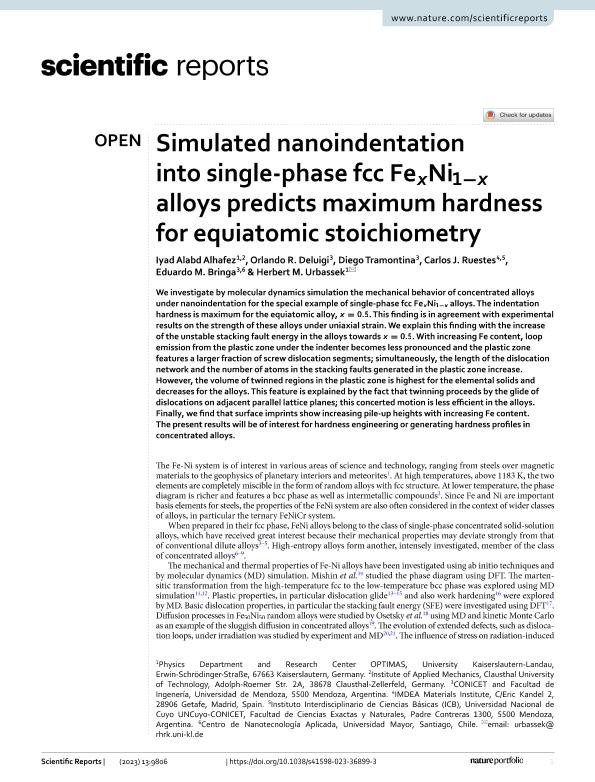Mostrar el registro sencillo del ítem
dc.contributor.author
Alhafez, Iyad Alabd
dc.contributor.author
Deluigi, Orlando Raul

dc.contributor.author
Tramontina Videla, Diego Ramiro

dc.contributor.author
Ruestes, Carlos Javier

dc.contributor.author
Bringa, Eduardo Marcial

dc.contributor.author
Urbassek, Herbert M.

dc.date.available
2024-02-05T15:27:49Z
dc.date.issued
2023-06
dc.identifier.citation
Alhafez, Iyad Alabd; Deluigi, Orlando Raul; Tramontina Videla, Diego Ramiro; Ruestes, Carlos Javier; Bringa, Eduardo Marcial; et al.; Simulated nanoindentation into single-phase fcc Fe x Ni 1-x alloys predicts maximum hardness for equiatomic stoichiometry; Nature Research; Scientific Reports; 13; 1; 6-2023; 1-14
dc.identifier.uri
http://hdl.handle.net/11336/225829
dc.description.abstract
We investigate by molecular dynamics simulation the mechanical behavior of concentrated alloys under nanoindentation for the special example of single-phase fcc Fe x Ni 1-x alloys. The indentation hardness is maximum for the equiatomic alloy, x= 0.5 . This finding is in agreement with experimental results on the strength of these alloys under uniaxial strain. We explain this finding with the increase of the unstable stacking fault energy in the alloys towards x= 0.5 . With increasing Fe content, loop emission from the plastic zone under the indenter becomes less pronounced and the plastic zone features a larger fraction of screw dislocation segments; simultaneously, the length of the dislocation network and the number of atoms in the stacking faults generated in the plastic zone increase. However, the volume of twinned regions in the plastic zone is highest for the elemental solids and decreases for the alloys. This feature is explained by the fact that twinning proceeds by the glide of dislocations on adjacent parallel lattice planes; this concerted motion is less efficient in the alloys. Finally, we find that surface imprints show increasing pile-up heights with increasing Fe content. The present results will be of interest for hardness engineering or generating hardness profiles in concentrated alloys.
dc.format
application/pdf
dc.language.iso
eng
dc.publisher
Nature Research
dc.rights
info:eu-repo/semantics/openAccess
dc.rights.uri
https://creativecommons.org/licenses/by/2.5/ar/
dc.subject
Molecular dynamics
dc.subject
Iron
dc.subject
Nickel
dc.subject
Indentation
dc.subject.classification
Física de los Materiales Condensados

dc.subject.classification
Ciencias Físicas

dc.subject.classification
CIENCIAS NATURALES Y EXACTAS

dc.title
Simulated nanoindentation into single-phase fcc Fe x Ni 1-x alloys predicts maximum hardness for equiatomic stoichiometry
dc.type
info:eu-repo/semantics/article
dc.type
info:ar-repo/semantics/artículo
dc.type
info:eu-repo/semantics/publishedVersion
dc.date.updated
2024-01-29T15:29:28Z
dc.identifier.eissn
2045-2322
dc.journal.volume
13
dc.journal.number
1
dc.journal.pagination
1-14
dc.journal.pais
Reino Unido

dc.journal.ciudad
Londres
dc.description.fil
Fil: Alhafez, Iyad Alabd. University of Kaiserslautern; Alemania. Clausthal University of Technology; Alemania
dc.description.fil
Fil: Deluigi, Orlando Raul. Consejo Nacional de Investigaciones Científicas y Técnicas. Centro Científico Tecnológico Conicet - Mendoza; Argentina. Universidad de Mendoza. Facultad de Ingenieria; Argentina
dc.description.fil
Fil: Tramontina Videla, Diego Ramiro. Consejo Nacional de Investigaciones Científicas y Técnicas. Centro Científico Tecnológico Conicet - Mendoza; Argentina. Universidad de Mendoza. Facultad de Ingenieria; Argentina
dc.description.fil
Fil: Ruestes, Carlos Javier. Consejo Nacional de Investigaciones Científicas y Técnicas. Centro Científico Tecnológico Conicet - Mendoza. Instituto Interdisciplinario de Ciencias Básicas. - Universidad Nacional de Cuyo. Instituto Interdisciplinario de Ciencias Básicas; Argentina. Instituto Imdea Energia.; España
dc.description.fil
Fil: Bringa, Eduardo Marcial. Consejo Nacional de Investigaciones Científicas y Técnicas. Centro Científico Tecnológico Conicet - Mendoza; Argentina. Universidad de Mendoza. Facultad de Ingenieria; Argentina. Universidad Mayor; Chile
dc.description.fil
Fil: Urbassek, Herbert M.. University of Kaiserslautern; Alemania
dc.journal.title
Scientific Reports
dc.relation.alternativeid
info:eu-repo/semantics/altIdentifier/url/https://www.nature.com/articles/s41598-023-36899-3
dc.relation.alternativeid
info:eu-repo/semantics/altIdentifier/doi/http://dx.doi.org/10.1038/s41598-023-36899-3
Archivos asociados
